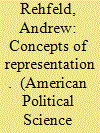|
|
|
Sort Order |
|
|
|
Items / Page
|
|
|
|
|
|
|
| Srl | Item |
| 1 |
ID:
110549


|
|
|
|
|
| Publication |
2011.
|
| Summary/Abstract |
In this reply to Jane Mansbridge's "Clarifying the Concept of Representation" in this issue (American Political Science Review 2011). I argue that our main disagreements are conceptual, and are traceable to the attempt to treat the concept of representation as a "single highly complex concept" as Hanna Pitkin once put it. Instead, I argue, it would be more useful to develop the various concepts that emphasize the underlying forms of representation. Against the view that empirical regularity should guide concept formation, I suggest that the failure to find instances of the cases I conceptualize is not itself a reason to reject them. Instead, I argue in favor of concepts that emphasize one side or other of a relationship, rather than treating both sides simultaneously, defending the view that "promissory" and "anticipatory" may usefully describe the activity of "representing" but ought to emphasize only one side of the representative-voter relationship. I also explain why adding substantive accounts of representation to any of Mansbridge's modifying concepts dilutes their practical value. I conclude by indicating the importance of developing concepts that stretch beyond the democratic contexts that feature prominently in her response.
|
|
|
|
|
|
|
|
|
|
|
|
|
|
|
|
| 2 |
ID:
097628


|
|
|
|
|
| Publication |
2010.
|
| Summary/Abstract |
Penn State's decision to eliminate political theory set off existential angst about the status of political theory in the discipline. The organized, defensive responses to that decision failed to answer the central question it posed: Is "political theory" social science, and if not, why does it belong? I argue that social scientific political theory is political science and its many strains-conceptual, normative, and explanatory-belong in the discipline on their own terms. Humanistic research, like dermatology or music theory, is not political science and as such it should find another home. By explaining why (and what kinds of) political theory is political science this article may wind up being offensive in both senses of the word. But it is meant to be in service to a more secure, stable, and productive interdisciplinary future for all kinds of political theory going forward.
|
|
|
|
|
|
|
|
|
|
|
|
|
|
|
|
| 3 |
ID:
090805


|
|
|
|
|
| Publication |
2009.
|
| Summary/Abstract |
The trustee/delegate problem purportedly expresses how closely a representative's votes in the legislature should correspond to their constituents' preferences. In this article, I argue that the usual formulation of this debate collapses three distinctions-aims, source of judgment, and responsiveness-and thus obscures the underlying complexity of the phenomenon. Given its tripartite formulation, the collapse of these distinctions into a binary "trustee/delegate" formulation obscures a more complex political landscape with eight-rather than two-ideal types. Furthermore, once unpacked, we can see that the distinctions operate entirely independent of the location of authority, leading to the seemingly paradoxical instructed trustees and independent delegates. I also claim that the three distinctions apply to any decision maker, and thus, the attribution of this problem as distinctive of democratic political representation is an important overstatement. The article thus contributes to a more general theory of political representation that can be applied in nonelectoral and nondemocratic contexts increasingly relevant to global politics.
|
|
|
|
|
|
|
|
|
|
|
|
|
|
|
|
|
|
|
|
|